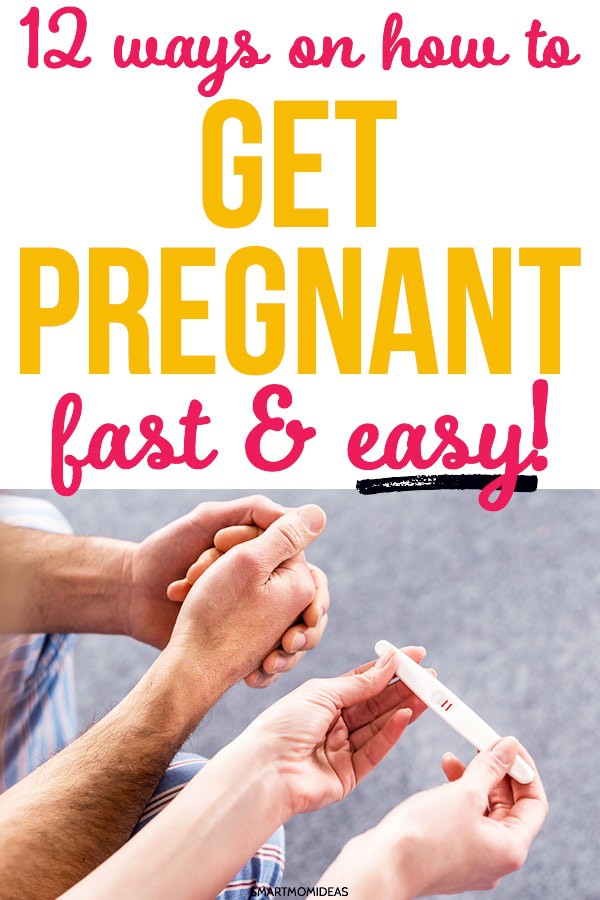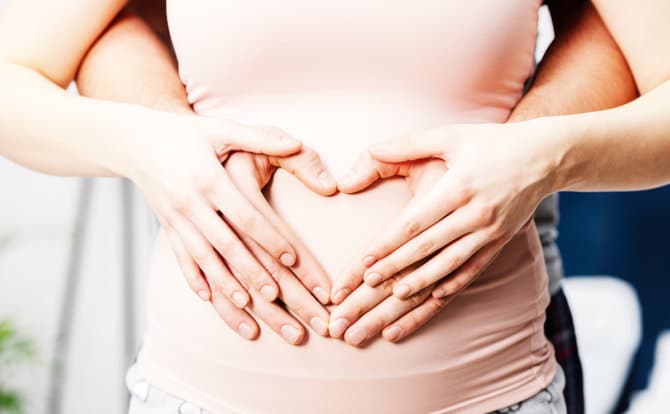Learn how to increase your chances on conception and get pregnant fast and easy!

When it comes to conceiving a baby, the mechanics seem pretty straight forward (you know what I’m talking about).
However, many women and their partners struggle with making that happen.
They wait month after month for a period to not show up and checking pregnancy tests for those two telltale lines.
Before chalking up your difficulties with getting pregnant to infertility, you should know that sometimes the body is just not in prime condition to conceive a child.
While your efforts may seem in vain, it may be that you simply need to create habits, or nix certain ones, in order to create a healthy environment to help with getting pregnant fast and easy.
I had difficulty getting pregnant and needed help to conceive our twins. I found that changing my diet and habits really helped on getting pregnant.
The biggest changer for me was taking a fertility supplement. My husband also took a male version to help with conception.
Here are some changes you can make to your life to help increase your chances of getting pregnant.
How to Get Pregnant

1. Maintain a Healthy Body Weight
Being overweight or underweight can affect your body’s ability to conceive. Carrying too much or too little weight on your body can cause irregular periods.
This is because your fat cells are related to estrogen production. Too many fat cells creates too much estrogen while too few creates low estrogen levels. Either situation can make it difficult to become pregnant.
Speak to your doctor about what a healthy weight would be for your height and frame. Generally, a healthy BMI (Body Mass Index) falls between 18.5 and 24.9.
To help you achieve a healthy body weight, make sure to follow the fertility diet.
2. Lower Your Stress
A regular menstrual cycle is important when it comes to your fertility. Once stress begins to affect the regularity of your period, getting pregnant may become difficult.
High levels of stress-related enzymes can impact your period by making your period longer or heavier or even prevent it from occurring at all. Stress can also lead to mid-cycle bleeding.
If you find yourself experiencing high levels of stress, do not hesitate to seek support from your partner, family and friends. You may also find comfort in counseling or a group support setting, depending on what the source of your stress is.
For everyday stresses, try to find a relaxation method that works for you. This may include meditation and yoga or simply having an hour or two to yourself to binge watch your favorite series or lay in a warm and relaxing bath.
3. Quit Smoking
Smoking increases the risk of infertility, miscarriage, ectopic pregnancy and complications during pregnancy.
The chemicals found in cigarettes can cause damage to not only the egg but the sperm as well. They effect the DNA of the egg and the sperm as well as hormone production and the fertilized egg’s ability to reach the uterus.
If you are a smoker, you should try to quit at least 3 months before trying to become pregnant. Quitting smoking can be hard so consider speaking with your doctor about safe and affective aids to help you quit.
4. Track Your Ovulation
Knowing when you are ovulating can help to increase your chances of fertilizing an egg.
Your ovaries begin releasing eggs about 14 days after the first day of your last period. The egg lives for 12-24 hours after being released and must be fertilized during this time.
Once you figure out when your peak ovulation period is, having sex 2-3 times a week will increase your chances of the egg becoming fertilized.
5. Pay Attention to Your Menstrual Cycle
Again, menstrual regularity is important. Tracking your period – and basal body temperature – can help you identify any irregularities as well as your peak fertile times.
A regular menstrual cycle should occur ever 21 to 35 days and last 2 to 7 days. Keep in mind, this is what is considered “normal” for the average woman.
The length, flow and symptoms of your cycle may vary and differ from the norm. Your normal flow may be different than another woman’s normal flow.
However, there are certain signs that indicate that your cycle is not regular. Here are some symptoms of an irregular period:
- Your period stops for more than 90 days (and you are not pregnant).
- You bleed for more than 7 days.
- You soak through more than 1 tampon or pad every 1 to 2 hours.
- Your periods are less 21 days or more than 35 days apart.
- You bleed between periods.
If you find your period is irregular, speak to your doctor about possible causes and ways that you can get your period back on track.
6. Take Prenatal Vitamins
You may be thinking: aren’t prenatal vitamins taken during pregnancy? It’s actually been shown that taking prenatal vitamins 2-3 months before you stop contraception can help with getting pregnant fast and easy.
This is because prenatal vitamins may provide nutritional supplements from your diet that are key to increasing your fertility. Prenatal vitamins can also help to regulate your period which, as mentioned before, is important in increasing your chances of pregnancy.
7. Stop Using Lubrication
Of course, having sex is key to becoming pregnant, but did you know that using lubrication may be hindering your efforts?
Lubrication can slow down sperm or prevent it from surpassing the cervix into the uterus. While you are ovulating, your body tends to produce more natural lubrication than usual.
However, if you still need some help in that department, there are “fertility friendly” lubes you can purchase that will not affect the sperm’s journey to the egg.
8. Exercise Regularly
The healthier your body, the easier it is to get pregnant. Apart from maintaining a healthy weight, you should try to incorporate at least 3o minutes of exercise into your day.
Just don’t overdo it – vigorous exercise can overexert your body and make it more difficult to become pregnant.
9. Cut Out Alcohol and Cut Down Caffeine
Frequent alcohol consumption can lead to ovulation disorders and increase the risk of complications during pregnancy.
Caffeine can also have adverse effects, but to a far lesser degree. Cutting down is sufficient, limiting caffeine intake to around 200mg per day.
10. Prep Your Man
It takes two to make a baby, so your partner’s sexual health is important as well. Factors such as weight and healthy living can positively affect your partner’s sperm production and increase the chances of pregnancy.
Men can also take other precautions to ensure optimal fertility. For example, taking zinc supplements and keeping the testicles cool by avoiding high temperatures can help to increase a man’s sperm count.
11. Get a Cervical Screening Test
Also known as a “smear test,” a cervical screening test can check for abnormal cells on the cervix. If any abnormal cells are detected, they can be treated early in order to avoid fertility issues.
Used mainly as a means of testing for HPV (Human papillomavirus), a cervical screening test is performed just like a pap test. The only difference is that the small sample of cells taken from the cervix are processed differently in the lab.
While having HPV does not directly affect the ability to become pregnant, having it can increase the risk of developing precancerous or cancerous cells in your cervix. These cells could affect your fertility and changes of becoming pregnant.
12. Talk to Your Doctor
If you are planning on becoming pregnant, considering making an appointment with your doctor. They can review any prescribed medication you are taking and determine if any of them may affect your chances of conceiving.
They can also take a look at any medical conditions you have in case there are any risks associated with them.
If you are having difficulties becoming pregnant, a doctor may be able to refer you to a fertility expert to help determine if there are any medical issues preventing you from doing so.
How to Get Pregnant
Don’t despair, mama!
For me, I had to have help with conceiving but I wouldn’t have it any other way. Try these methods and make sure to take fertility supplements to enhance your chance of getting pregnant!
Over to you – do you have any more tips to help increase your chances of conceiving? Share in the comments!





Leave a Reply